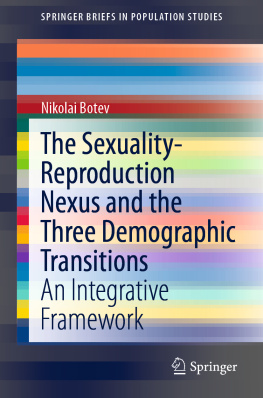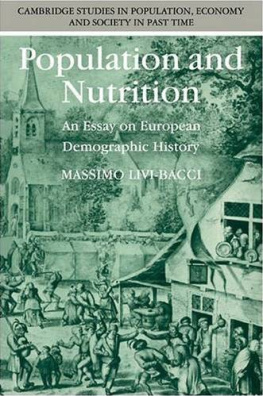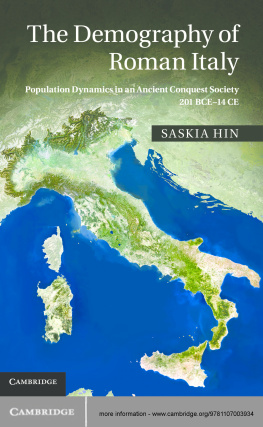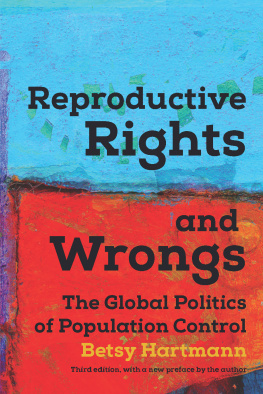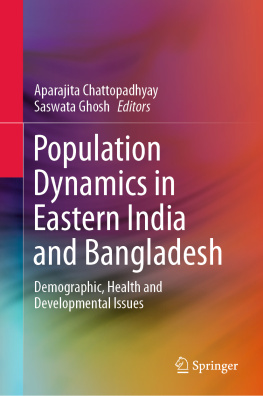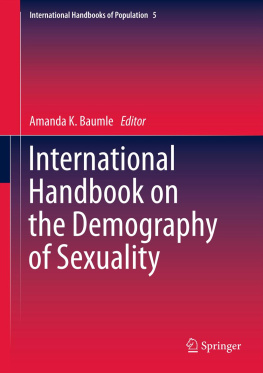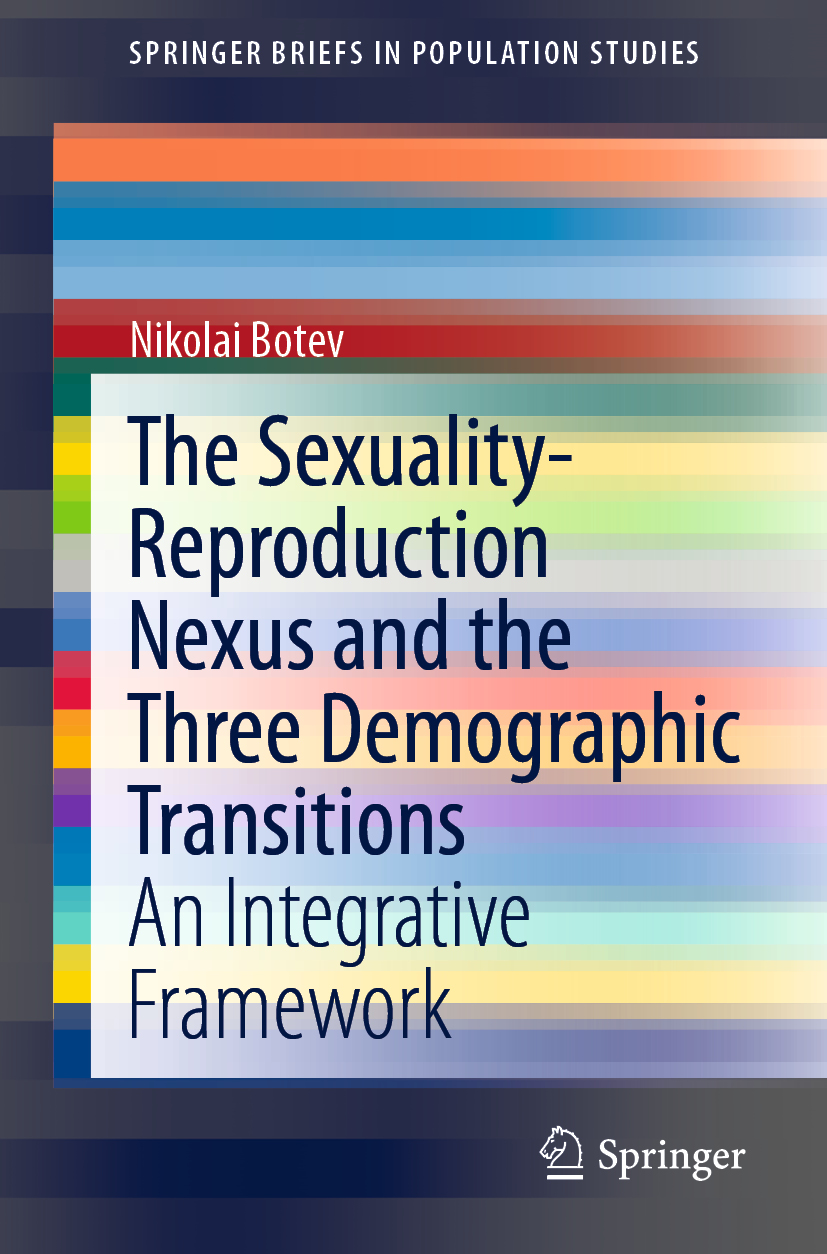SpringerBriefs in Population Studies
Advisory Editors
Baha Abu-Laban
Edmonton, AB, Canada
Mark Birkin
Leeds, UK
Dudley L. Poston Jr.
Department of Sociology, Texas A&M University, College Station, TX, USA
John Stillwell
Leeds, UK
Hans-Werner Wahl
Deutsches Zentrum fr Alternsforschung (DZFA), Institut fr Gerontologie, Universitt Heidelberg, Heidelberg, Germany
D. J. H. Deeg
VU University Medical Centre/LASA, Amsterdam, The Netherlands
SpringerBriefs in Population Studies presents concise summaries of cutting-edge research and practical applications across the field of demography and population studies. It publishes compact refereed monographs under the editorial supervision of an international Advisory Board. Volumes are compact, 50 to 125 pages, with a clear focus. The series covers a range of content from professional to academic such as: timely reports of state-of-the art analytical techniques, bridges between new research results, snapshots of hot and/or emerging topics, and in-depth case studies.
The scope of the series spans the entire field of demography and population studies, with a view to significantly advance research. The character of the series is international and multidisciplinary and includes research areas such as: population aging, fertility and family dynamics, demography, migration, population health, household structures, mortality, human geography and environment. Volumes in this series may analyze past, present and/or future trends, as well as their determinants and consequences. Both solicited and unsolicited manuscripts are considered for publication in this series.
SpringerBriefs in Population Studies will be of interest to a wide range of individuals with interests in population studies, including demographers, population geographers, sociologists, economists, political scientists, epidemiologists and health researchers as well as practitioners across the social sciences.
More information about this series at http://www.springer.com/series/10047
Nikolai Botev
The Sexuality-Reproduction Nexus and the Three Demographic Transitions
An Integrative Framework
Nikolai Botev
Baden bei Wien, Austria
ISSN 2211-3215 e-ISSN 2211-3223
SpringerBriefs in Population Studies
ISBN 978-3-030-37554-6 e-ISBN 978-3-030-37555-3
https://doi.org/10.1007/978-3-030-37555-3
The Author(s), under exclusive license to Springer Nature Switzerland AG 2020 corrected publication 2020
This work is subject to copyright. All rights are solely and exclusively licensed by the Publisher, whether the whole or part of the material is concerned, specifically the rights of translation, reprinting, reuse of illustrations, recitation, broadcasting, reproduction on microfilms or in any other physical way, and transmission or information storage and retrieval, electronic adaptation, computer software, or by similar or dissimilar methodology now known or hereafter developed.
The use of general descriptive names, registered names, trademarks, service marks, etc. in this publication does not imply, even in the absence of a specific statement, that such names are exempt from the relevant protective laws and regulations and therefore free for general use.
The publisher, the authors and the editors are safe to assume that the advice and information in this book are believed to be true and accurate at the date of publication. Neither the publisher nor the authors or the editors give a warranty, expressed or implied, with respect to the material contained herein or for any errors or omissions that may have been made. The publisher remains neutral with regard to jurisdictional claims in published maps and institutional affiliations.
This Springer imprint is published by the registered company Springer Nature Switzerland AG
The registered company address is: Gewerbestrasse 11, 6330 Cham, Switzerland
To my wife, Renata,
and sons, Vassil and Daniel,
for making it all make sense
Preface
This monograph outlines an integrative framework that conceptualizes the role of relations of control in human reproduction and long-term population dynamics. It draws on population studies, especially the demographic transition theory, on sexuality studies and Foucaults concept of bio-power and sexuality as a key to social control, on cognate concepts and theories, and on findings from demography, anthropology, archeology, and other disciplines. The framework is based on the premise that four demographic regimes can be identified over the course of human history. They are defined by the primary locus and modus of control over reproduction, with regulating sexuality being a proxy for that control over much of human history. The hypothesis is that the locus of control has moved from kin/group control during the paleo regime, via social control by rigidly regulating sexuality, mostly through the institution of marriage, during the patriarchal regime, to individual control made possible by effective contraception, freer expression of sexuality and changing gender roles in the contemporary regime, and is likely to move to a combination of individual control over coital reproduction and social control over non-coital reproduction during the assisted reproduction regime.
The framework questions some of the basic postulates in population studies, including how demographic transitions are interpreted and whether prehistoric population growth was close to zero. It promotes an integrative approach to population dynamics and emphasizes the importance of understanding the deeper historical roots and evolutionary underpinnings of demographic trends and patterns. After all, human reproduction has been shaped since the origin of the human lineage millions of years ago. Basing our theories about reproduction (and sexuality) on just the last couple of decades (or a couple of centuries at most) is likely to generate an incomplete picture and miss the implications of evolved mechanisms on the realities of contemporary life (the particular front-loaded age profile of fecundity in women and menopause are good examples of such evolved mechanisms that have salient implications for fertility and the life course).
Some of the ideas outlined in the monograph were conceived in the 1980s and 1990s, when early in my career in the population field I was fascinated by the classical demographic transition theory, but also started to ponder over its limitations. A long gestation period followed, which took me and the nascent ideas through the halls of the Palais des Nations in Geneva, the buzz of Midtown Manhattan, the serenity of the steppes and mountains of Central Asia, the heat of the Horn of Africa, and then back to the heart of Europe, with many encounters and much cross-fertilization in the process. Such a long gestation period hopefully resulted in a precocial newborn, i.e., one that is fully fit for life, even though just like human infants it would benefit from supportive alloparenting (especially in the form of help in testing the hypotheses and assumptions underlying the integrative framework outlined here, and in further developing the ideas behind it).
Continuing the birthing and parenting allusions, I need to acknowledge the many individuals who contributed to the DNA of the ideas outlined in this monograph. These include numerous co-workers and colleagues at the Demographic Research Laboratory of the former Higher Institute of Economics in Sofia, the United Nations Economic Commission for Europe (UNECE), and the United Nations Population Fund (UNFPA), as well as national and other counterparts with whom I had a chance to interact, exchange ideas, and learn from. I am indebted to all of them, even though they are too many to list here by name. Dilyana Boteva-Boyanova and Raiko Krauss were the first to comment on early drafts of the manuscript. Elwood Carlson provided useful comments on a version presented at the 2018 European Population Conference. Daniel Botev helped with Figure 1. I benefited also from the comments and suggestions of the anonymous reviewers. Special thanks to Springer Nature, and especially Evelien Bakker, Senior Publishing Editor, and Bernadette Deelen-Mans, for encouraging me to develop further the ideas outlined in this monograph.

